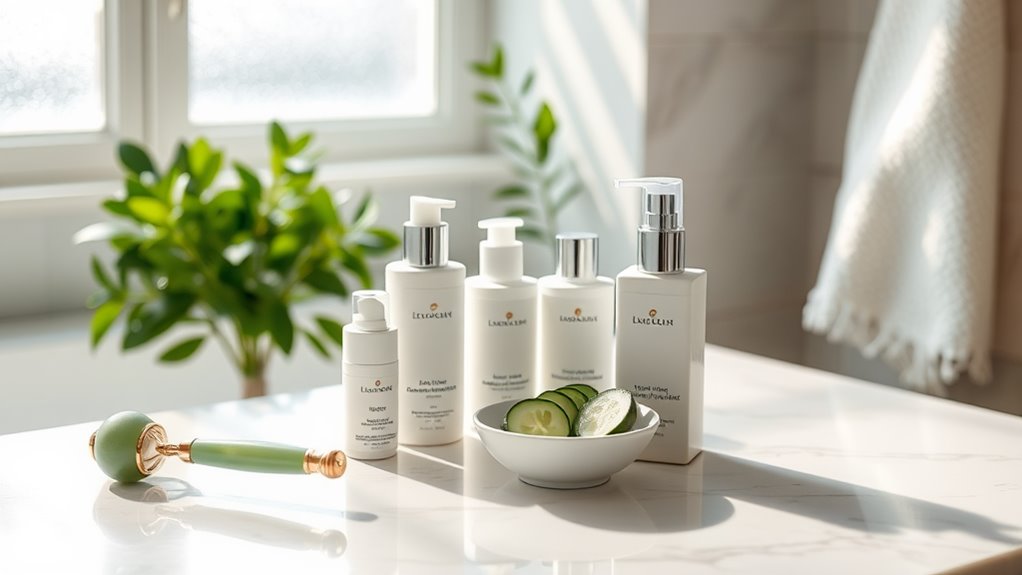These Tips Made My Skin Less Sensitive in 2 Weeks
By implementing gentle skincare routines, using hypoallergenic products, and ensuring proper hydration, you can reduce skin sensitivity in just two weeks. Focus on mild cleansers, moisturizing regularly with ceramides and hyaluronic acid, and protecting your skin from environmental irritants like pollution and UV rays. Track your skin’s reactions to identify triggers and continue using soothing ingredients like aloe vera. These foundational strategies can transform your skin’s resilience—discover other effective methods to enhance your skincare journey further.
Understanding Sensitive Skin
Sensitive skin is a common condition that can manifest as redness, itching, or irritation in response to various stimuli.
To manage this condition effectively, you should identify triggers like harsh weather, certain fabrics, or specific skincare ingredients. Consider keeping a diary to track reactions.
Additionally, practice gentle skincare routines, avoiding scrubs or exfoliants that may exacerbate sensitivity. Always patch-test new products before full application.
Moisturizing daily can help strengthen your skin barrier. Evidence-based ingredients such as aloe vera and chamomile can also provide calming effects.
Finally, maintain a balanced diet rich in antioxidants to support overall skin health.
These tips for sensitive skin can lead to significant improvements in your skin’s comfort and appearance.
Choosing the Right Skincare Products
When selecting skincare products, it’s essential to prioritize formulations that cater to your unique skin needs.
Look for products labeled “hypoallergenic” and “fragrance-free,” as these minimize potential irritants.
Ingredients like ceramides, glycerin, and hyaluronic acid help maintain skin barrier integrity, while soothing agents such as aloe vera and chamomile can reduce sensitivity.
Always conduct a patch test before full application to identify any adverse reactions.
Avoid alcohol-based products, which can exacerbate sensitivity.
Finally, consult with a dermatologist if you’re uncertain about specific ingredients or formulations, ensuring your skincare routine is effective and tailored to your skin’s requirements. Additionally, be aware that signs of a compromised skin barrier can include redness and sensitivity, which may indicate the need for a change in your skincare approach.
Establishing a Gentle Cleansing Routine
A gentle cleansing routine is essential for maintaining skin health without triggering irritation. To establish this routine, focus on using mild, non-foaming cleansers that effectively remove impurities without stripping natural oils. Aim to cleanse twice daily, once in the morning and once before bed. Below is a table to help you choose the right cleansing method:
| Cleansing Method | Frequency | Skin Type |
|---|---|---|
| Micellar Water | Daily | Sensitive, Dry |
| Cream Cleanser | Twice Daily | Normal, Combination |
| Oil Cleanser | As Needed | Oily, Acne-Prone |
| Gel Cleanser | Daily | Oily |
| Hydrating Cleansing Balm | Twice Daily | All Skin Types |
Incorporating the right cleansing frequency based on skin type is crucial for achieving optimal skin health.
Incorporating Hydration and Moisturization
How can you effectively incorporate hydration and moisturization into your skincare routine?
Start by selecting a hydrating serum containing hyaluronic acid or glycerin, applying it to damp skin to lock in moisture.
Follow this with a moisturizer suited for your skin type, focusing on ingredients like ceramides or squalane for barrier support.
Aim for twice-daily application—morning and evening—as consistency is key.
Don’t forget to drink plenty of water throughout the day to support overall skin hydration from within.
Finally, consider adding a hydrating face mist for quick refreshment during the day, especially in dry environments. Additionally, using ingredients like hyaluronic acid can enhance your skin’s ability to retain moisture, making it an essential component of effective hydration.
Protecting Your Skin From Environmental Irritants
What steps can you take to shield your skin from environmental irritants? Start by identifying irritants and minimizing exposure. Use protective clothing and apply barrier creams. Here’s a simple table to guide you:
| Irritant | Protection Method | Recommended Product |
|---|---|---|
| Pollution | Wear a mask | Anti-pollution serum |
| UV Rays | Use sunscreen | SPF 30 or higher |
| Harsh Chemicals | Choose gentle cleansers | Fragrance-free soap |
Furthermore, understanding how environmental pollutants affect skin health can empower you to make informed choices for your skincare routine.
Adopting a Healthy Lifestyle for Skin Health
Environmental irritants can compromise skin health, making it essential to adopt a healthy lifestyle that supports your skin’s resilience.
Start by prioritizing a balanced diet rich in antioxidants, vitamins, and healthy fats, which can strengthen skin barriers. Stay hydrated, as adequate water intake helps maintain skin elasticity and moisture. Regular exercise improves circulation, delivering essential nutrients to your skin while promoting detoxification. Additionally, make sure you get enough sleep, allowing your skin to repair and regenerate. Avoid excessive alcohol and smoking, as these can exacerbate sensitivity. Incorporating hydration techniques into your daily routine can significantly enhance your skin’s overall appearance.

